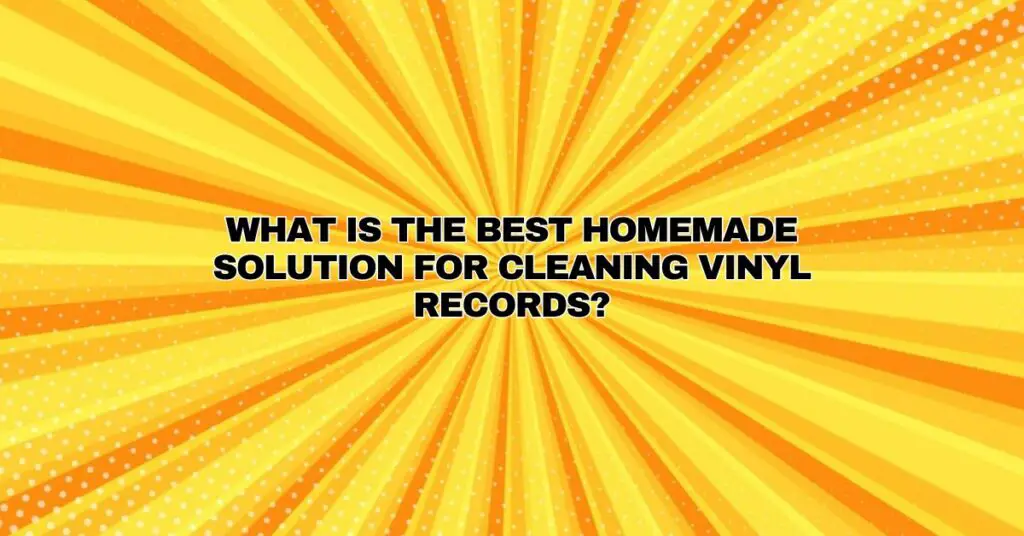Vinyl records are beloved for their warm analog sound, but to enjoy them fully, it’s crucial to keep them clean. While commercial vinyl cleaning solutions are readily available, some enthusiasts prefer to create their homemade cleaning solutions. In this comprehensive guide, we will explore how to craft the best homemade solution for cleaning vinyl records. By using readily available ingredients and following these steps, you can ensure your records remain in excellent condition and provide a pristine listening experience.
1. Why Consider a Homemade Solution
Homemade solutions for cleaning vinyl records have gained popularity for several reasons:
- Cost-Effective: Homemade solutions are often more budget-friendly than commercial ones.
- Customizable: You can tailor the solution to your specific preferences and needs.
- DIY Enthusiasm: Crafting your own cleaning solution can be a satisfying DIY project for vinyl enthusiasts.
2. Ingredients for the Homemade Solution
To create an effective homemade cleaning solution, you’ll need a few simple ingredients:
- Distilled Water: Distilled water is free of impurities and minerals that could potentially harm your records.
- Isopropyl Alcohol (99% pure): High-purity isopropyl alcohol is excellent for removing dirt and contaminants from the record surface.
- Dishwashing Detergent: A few drops of mild dishwashing detergent will help break down dirt and grime.
3. Crafting the Homemade Cleaning Solution
Follow these steps to create the perfect homemade cleaning solution for your vinyl records:
- Gather Supplies: Ensure you have distilled water, high-purity isopropyl alcohol (at least 99% pure), and a mild dishwashing detergent on hand.
- Measuring Ingredients: In a clean container, combine distilled water and high-purity isopropyl alcohol in a 4:1 ratio (four parts water to one part alcohol). This ratio ensures that the solution is gentle enough for your records.
- Adding Dishwashing Detergent: Add just a few drops of mild dishwashing detergent to the mixture. The detergent helps break down dirt and grime effectively.
- Mixing the Solution: Gently mix the ingredients by stirring them together. Avoid creating excessive foam or bubbles.
- Storage: Transfer the solution to a clean, airtight container for storage. Ensure the container is labeled clearly.
- Testing the Solution: Before applying the solution to your records, conduct a patch test on a less valuable or damaged record to ensure compatibility.
4. Application and Cleaning
Now that you have your homemade cleaning solution, follow these steps to clean your vinyl records effectively:
- Set Up Your Workspace: Choose a clean and clutter-free workspace to avoid contamination. Wash your hands thoroughly to remove oils and dirt.
- Dust Removal: Use a carbon fiber brush to gently remove surface dust and debris from the record. Brush along the grooves in a circular motion.
- Cleaning Motion: Apply a small amount of your homemade cleaning solution to a microfiber cloth. Wipe the record’s surface gently in the direction of the grooves, using a circular motion. Avoid applying excessive pressure.
- Rinse and Dry: Use a clean, dry microfiber cloth to wipe away any remaining cleaning solution residue. Ensure the record is completely dry before playing.
- Storage: After cleaning, store the record in a clean, protective inner sleeve and outer sleeve to prevent recontamination.
5. Conclusion
Crafting a homemade solution for cleaning vinyl records can be a cost-effective and satisfying endeavor for vinyl enthusiasts. By using distilled water, high-purity isopropyl alcohol, and a few drops of mild dishwashing detergent, you can create a cleaning solution tailored to your needs. Following the steps outlined in this guide will help you maintain your vinyl collection’s pristine condition, ensuring that your cherished records provide a rich and enjoyable listening experience for years to come.


